Dorence Atwater – Part 3
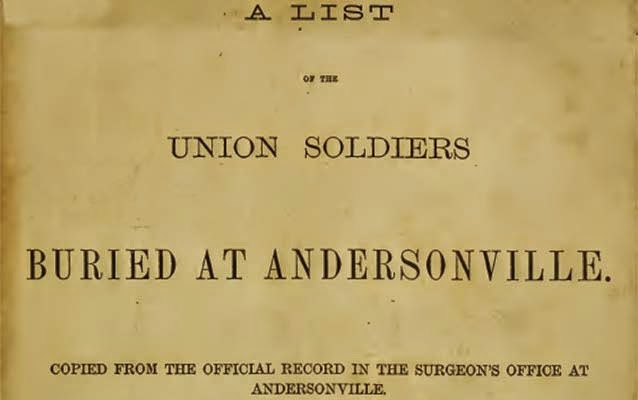 |
| Cover of A List of the Union Soldiers Buried at Andersonville Andersonville National Historic Site |
It is 1867.
Dorence Atwater is entering the 22ndyear of his life, and he has already had enough hardship for an entire lifetime. He served in the 2ndNew York Cavalry as a scout during the American Civil War, was captured by Confederate soldiers after the Battle of Gettysburg, imprisoned for almost two years in four individual Confederate prisons, kept a secret list of all of the dead from Andersonville prison in Georgia, had that list stolen from him by his own government, and then was imprisoned by his own government in Auburn State Prison when he tried to take his list back. He was spared a death by disease and maltreatment by the intervention of the Angel of the Battlefield, Clara Barton, who through her influence managed to get Dorence released from Federal prison. He spent the last year or so since his release helping Clara in her office, lecturing on his experiences, and getting his List of the Union Soldiers Buried at Andersonvillepublished, despite opposition from those around him.
It is 1867, and it is about time for Dorence Atwater’s life to turn around.
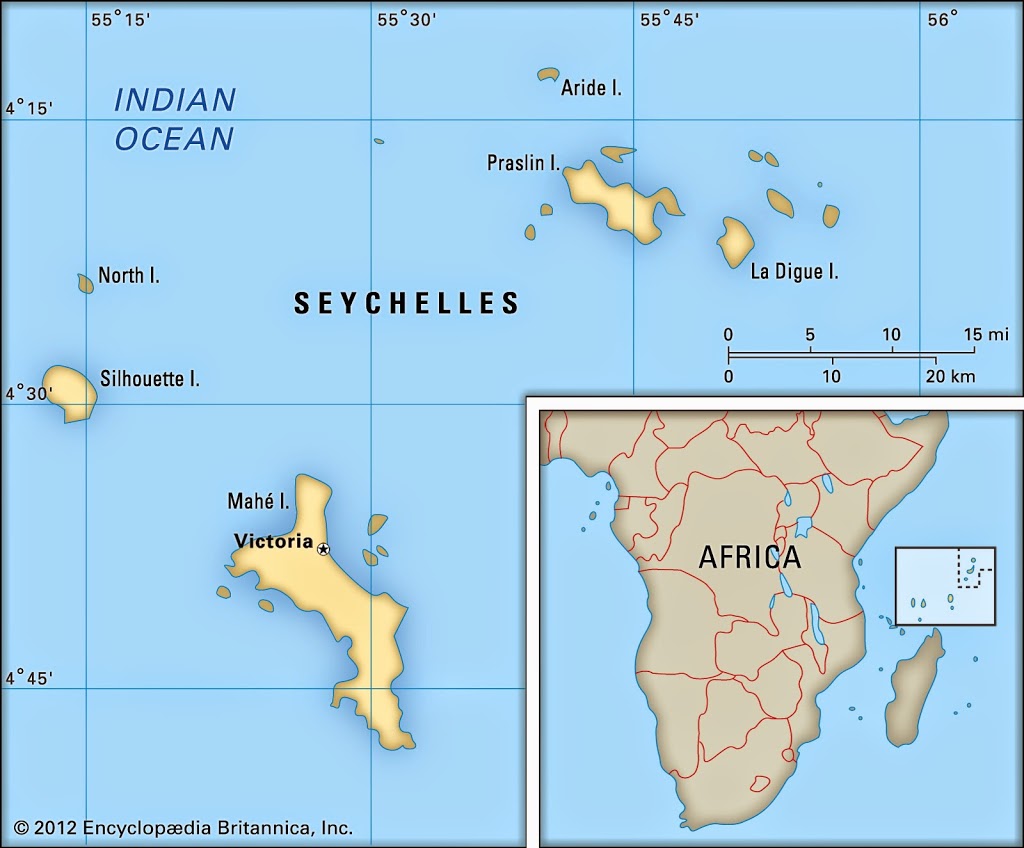 |
| The Seychelles Islands, east of Africa Seychelles: geography. Map/Still. Britannica Online for Kids. |
President Johnson, impressed by Dorence’s attitude and intelligence, and acting on the suggestions of many of his advisors and prominent citizens, decided to place him into consulate training. Dorence caught on quickly and, by 1868, he had been sent to the Seychelles Islands, a group of islands east of the continent of Africa and north of Madagascar, acting as the US Consul.
Reports of his experiences at the Seychelles are mixed. By some accounts, he performed his duties admirably, earned an invitation to the home of an Indian prince, and had an excellent time until his transfer. By other accounts, he had charges leveled against him for dereliction of duty, incompetence, and carelessness, until he was transferred to a different consulate position.
Regardless of what actually took place, the accounts agree on one detail: his transfer, in 1871 at the age of 26, halfway around the world to the island of Tahiti.
By all available accounts and information, Dorence did quite well as the US Consul to Tahiti, receiving commendations from many. Dorence himself is said to have loved the island, taking on many charitable works to enrich his new home, especially in his work with lepers; additionally, he started to pursue several entrepreneurial ventures into local plantations and other mercantile interests.
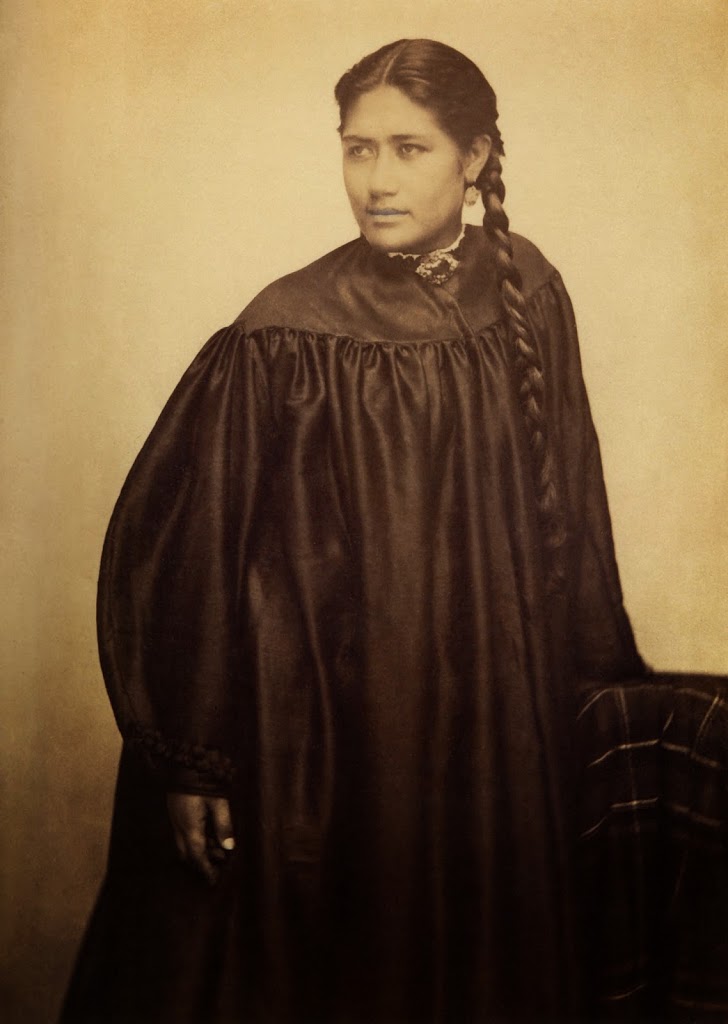 |
| Princess Moetia Salmon of Tahiti |
At some point during his first couple of years on Tahiti, Dorence met a woman named Arii’ino’ore Moetia Tepau Salmon – just Moetia Salmon for short – and they hit it off almost immediately. They were married by 1875, which certainly shocked all of Dorence’s detractors back in the United States, as he had married into royalty.
Princess Moetia Salmon, educated in France and England, was the sister of Queen Johanna Marau Ta’aroa a Tepau Salmon – Queen Marau Salmon, wife and consort of the current king – and though Moetia had no chance of becoming queen, she was the heiress of their father’s estate. Their father had been an English banker named Alexander Salmon who managed to marry Princess Oehau after traveling to Tahiti in a business venture.
Dorence Atwater did not hold the position of Consul to Tahiti forever, and resigned from his position in 1888. He maintained his influence over the island, continued his entrepreneurial and charitable works, and lived a very happy and successful life. He had taken a Tahitian name when he became a part of the Tahitian royal family: Tupuataroa, or “Wise Man”.
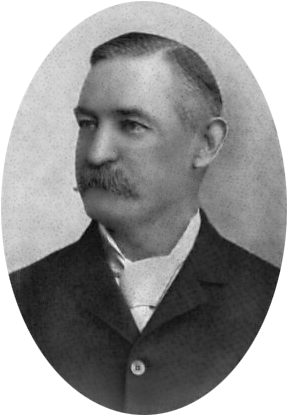 |
| Dorence Atwater later in life |
As he neared his 60’s, however, his health began to fade. He had never fully recovered from his mistreatment in the 1860s, mentally or physically; he is said to have raved at the sight or mention of a soldier, especially a US one, and even his wife’s later testimony mentioned his poor physical health.
Dorence and Moetia traveled to San Francisco in the early 1900s, and there Dorence died in 1910 to what was likely a heart attack while under the care of a doctor. He wished to be buried in Tahiti, having expressed that he certainly didn’t want to be buried in the United States. His body was embalmed and put on a ship headed home. Dorence Atwater was the first non-royal Tahitian to receive a Tahitian royal funeral; he is buried in the Papara Protestant Church Cemetery in Papara, Tahiti.
His wife, Moetia, lived for many more years than Dorence did, dying at the age of 87 in 1935.
This is why I am so fond of Dorence Atwater’s story. A boy who became a soldier was sent into an enemy prison for almost two years. After his release, he was arrested and mistreated by his own government for doing what he thought was right. He certainly was right, by every moral definition of the word, and he did get what was coming to him, even if it wasn’t immediate.
That boy turned soldier turned prisoner married into the royal family of a prosperous island, and spent the rest of his life succeeding as a businessman and helping others.
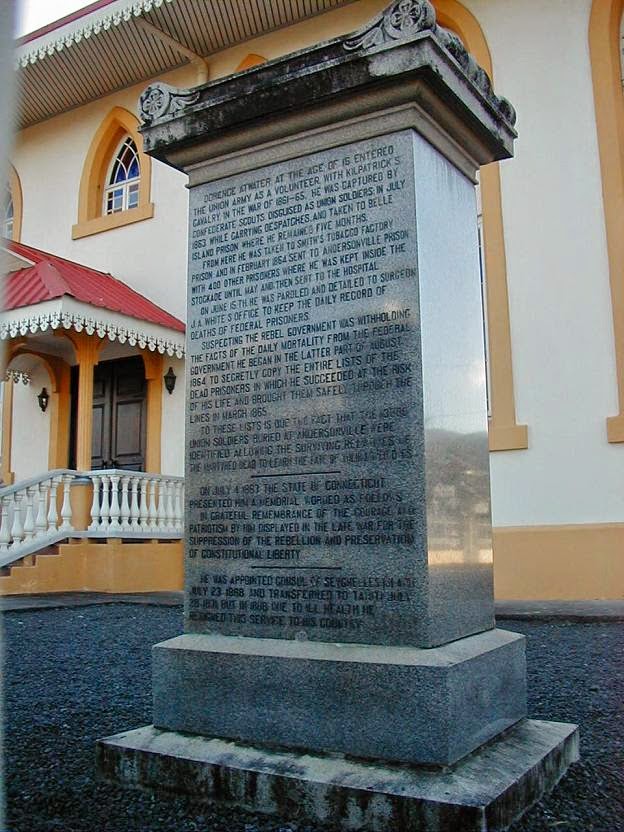 |
| Dorence Atwater’s Monument in Tahiti From findagrave.com |
I can think of no better end for Dorence Atwater’s tale than what is inscribed on his 7000lb stone grave marker: “He builded better than he knew that one day he might awake in surprise to found he had wrought a monument more enduring than brass.”
If you have enjoyed or are interested in Dorence Atwater’s life, please consider donating to the Clara Barton Missing Soldiers Office in DC. The Missing Soldiers Office would not have been possible without Dorence’s Death Register from Andersonville prison, just as Dorence’s later life successes would not have happened without the intervention of Clara Barton. Their lives are intertwined, and both stories will be told at the CBMSO.
If you are interested in playing a role in the preservation of the CBMSO, please go to www.gofundme.com/clarabartonor call 301-695-1864.
Until next week!
Posted in: Uncategorized

